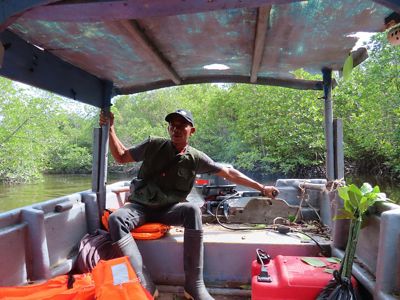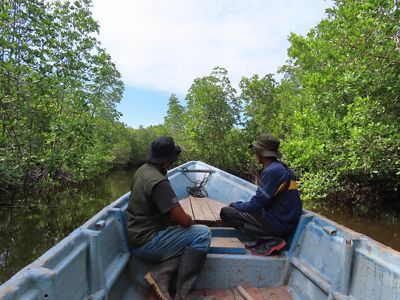Teluk Pambang Village in Bengkalis has successfully reduced its mangrove degradation rate
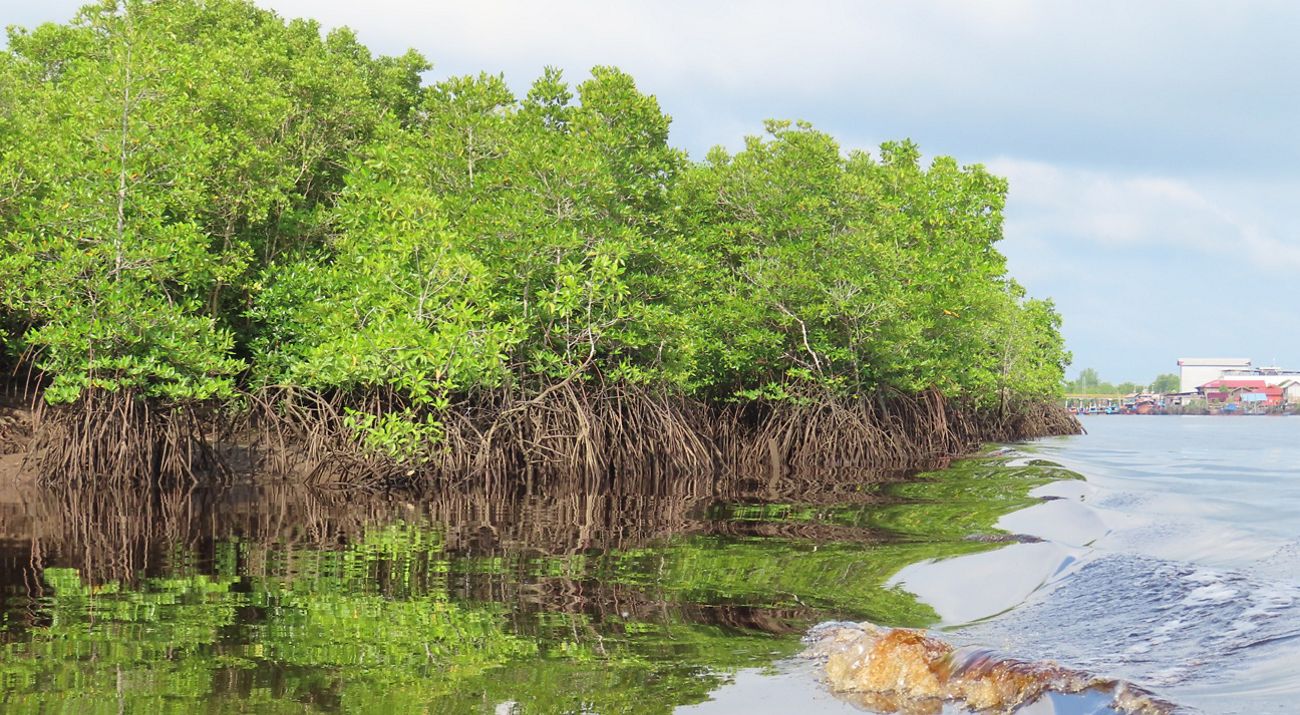
The community and government of Teluk Pambang Village, Bengkalis Regency, Riau Province, have significantly reduced the rate of mangrove forest degradation by 96%. The degradation rate, which reached an average of 27 ha per year (2016-2021), has now dropped to only 1 hectare per year (2022-2024). This success was achieved through a mangrove program implemented by Yayasan Konservasi Alam Nusantara (YKAN) with the support of HSBC Indonesia.
YKAN's mangrove program uses a Nature-based Solutions (NbS) approach that prioritizes community involvement. NbS emphasizes the importance of mangrove protection as a priority for climate change mitigation.
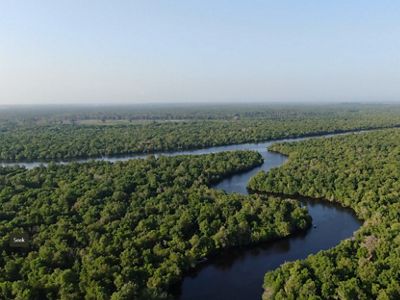
Mariski Nirwan, Senior Manager of Coastal Area Resilience at YKAN, explains "that rehabilitated mangroves can take up to four decades, or even longer, to reach their original carbon storage value. Therefore, protecting existing mangroves is considered one of the most strategic mitigation measures."
YKAN's mangrove program places communities at the heart of mangrove conservation. In Teluk Pambang village, active community participation in mangrove management has increased in the last two years, from just five people to 170 people organized into a Village Forest Management Board (LPHD). They regularly patrol to protect and monitor the mangrove forests of Teluk Pambang Village and the surrounding area.
Not only that, the mangrove group is also equipped with technical skills such as mangrove restoration, protection, and monitoring through the use of the Avenza map application and internet-based mangrove monitoring. The group is also equip ped with non-technical skills such as organizational governance, administration, program reporting, and technical proposal preparation.
This success was supported by the passing of the Teluk Pambang Village Regulation to protect 950 ha of mangrove forest. In addition, YKAN facilitated the community to obtain legality to manage the mangrove area through a social forestry scheme, which also opened up sustainable economic opportunities for the community. Two Social Forestry Business Groups (KUPS) have been established, the Honey Bee KUPS and the Mangrove Biota KUPS, which allow for the sustainable use of mangrove resources.
Background: The Importance of Mangrove Protection on Bengkalis Island
Bengkalis Island, which borders the Malacca Strait, one of the world's busiest international trade routes, has mangrove ecosystems that overlap with peatlands, resulting in a carbon storage potential of 1,969 tons C/ha, above the average carbon storage of mangroves in general. However, the island's mangrove area has declined by more than 1,207 ha (equivalent to 1,724 FIFA standard soccer fields) from 1990-2019 (YKAN, 2020). This shrinkage has also contributed to worsening coastal erosion of up to three meters per year in areas without mangroves.
The main threats to mangrove forests in Teluk Pambang Village include mangrove logging for charcoal production and land conversion to intensive shrimp ponds and oil palm plantations. This land conversion occurs due to a lack of public understanding of existing regulations, especially in the mangrove forest area of Teluk Pambang Village, where most of the area functions as a Limited Production Forest (HPT).
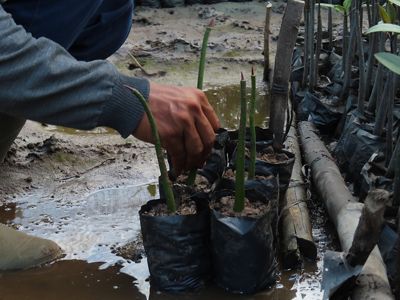
Sariono, Acting Head of Teluk Pambang Village, said, “Maintaining existing mangrove forests that are still good is more urgent than planting. Planting takes a long time for the forest to return, while our village, directly opposite the Malacca Strait, needs protection from big waves. We, the Teluk Pambang village government, thank YKAN for its dedication and assistance in initiating action to protect the mangrove forest together with the village government and the village forest management organization (LPHD).”
Ecosystem Restoration and Recovery
Teluk Pambang village has 320 ha of mangrove restoration potential, some of which are damaged mangrove areas thought to be the result of mangrove cutting for charcoal production as well as the opening of oil palm plantations and intensive shrimp ponds.
YKAN's restoration program focuses not only on planting but also on creating ideal environmental conditions for natural regeneration. YKAN's mangrove restoration plans are based on scientific research as a guide, allowing the mangrove restoration team to determine the most relevant strategies for each restoration area, with hydrological improvements, weed removal, and the installation of wooden fences to reduce wave power and trap sediment all showing positive results.
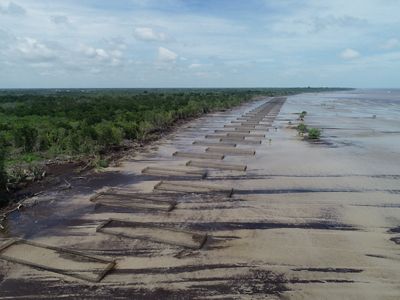
By 2025, natural mangrove regeneration by the Teluk Pambang village mangrove group and YKAN will have been observed in the 120 ha monitoring area. Mangrove cover is expected to be detectable through satellite imagery in 3-5 years. YKAN also uses a wooden mesh fence to protect the planted mangrove seedlings. Through this technique, the survival rate of seedlings grown at the end of the beach has increased from 0% to 50-80%.
Towards Replication and Sustainability
The achievements of YKAN's mangrove program in Teluk Pambang prove that a nature-based climate solutions approach can reduce the rate of mangrove degradation, improve ecosystem quality, and strengthen community participation and livelihoods. This model will be replicated in Kembung Luar and Kembung Baru villages in Bengkalis Regency, Riau Province, and is expected to serve as a lesson learned for other regions in Indonesia's sustainable mangrove management efforts.
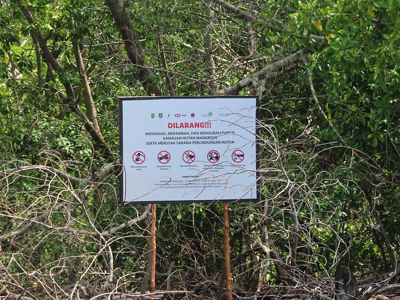
Samsul Bahri, Chairman of the Belukap Group in Teluk Pambang Village, said that YKAN's assistance in Teluk Pambang Village went beyond restoration. The program has initiated the formation of mangrove groups, which previously had only one active group, but have now become ten, to implement village regulations on mangrove management and protection. “YKAN and its partners have also provided organizational training and opened up opportunities to manage forests legally through Social Forestry Business Groups. We are a newborn baby, YKAN and our partners are helping us to walk and find the best way forward,” Bahri said.
Yayasan Konservasi Alam Nusantara (YKAN) is a scientific-based non-profit organization that has been present in Indonesia since 2014. With the mission of protecting lands and waters as life support systems, we provide innovative solutions to realize the harmony of nature and humans through effective natural resource management, prioritizing a non-confrontational approach, and building a network of partnerships with all stakeholders for a sustainable Indonesia. For more information, visit ykan.or.id.


